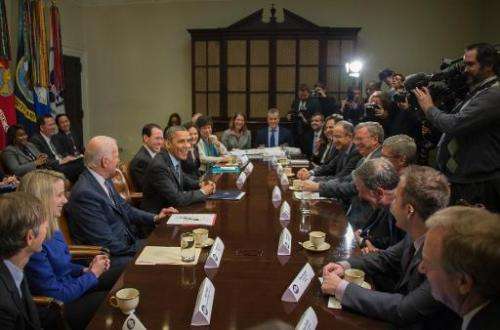US President Barack Obama (4thL) and Vice President Joe Biden (3rd L) meet with executives from leading tech companies at the White House in Washington, DC, December 17, 2013
Under fire from courts and allies over a vast US spying dragnet, President Barack Obama faced new heat Tuesday from Internet titans who fear the surveillance has crossed constitutional lines.
Obama met bosses of tech giants Google, Apple, Netflix, Yahoo and Twitter at the White House for talks also expected to include an update on the problem-plagued website underpinning his health reform plan.
The meeting came a day after a US court ruled that the National Security Agency's bulk collection of telephone records was probably unconstitutional, in the first blow of a long legal tussle over the program.
It also took place as Obama considers the findings of a panel he set up to recommend reform of US spy agency snooping in the wake of damaging revelations by fugitive intelligence analyst Edward Snowden.
The meeting, in the Roosevelt Room of the White House, was closed to the reporters and Obama made no public remarks. Press photographers were allowed into the room for less than a minute at the start to take pictures.
Top executives at the talks included include Sheryl Sandberg of Facebook, Tim Cook of Apple, Marissa Mayer of Yahoo, Eric Schmidt of Google and Dick Costolo of Twitter.
Obama is familiar with many of the people in the meeting—a number are high profile and wealthy supporters of his political campaigns.
But the revelations of a massive US spy snooping program on the Internet, leaked by Snowden, have strained ties between the White House and the US tech sector.
Eight leading US-based technology companies last week called on Washington to overhaul its surveillance laws following the revelations of online eavesdropping.
"The balance in many countries has tipped too far in favor of the state and away from the rights of the individual—rights that are enshrined in our Constitution," they wrote in an open letter to Obama.
A White House official said in a statement that the talks would focus on "national security and the economic impacts of unauthorized intelligence disclosures."
The US president also planned to discuss how the tech sector could help unleash new economic growth and job creation.
Obama was last week handed a report by a panel he charged with examining the National Security Agency spy programs and aides say he will propose some restraints on snooping on Internet and telephone data in the New Year.
But he is believed to be committed to permitting the NSA data mining operation to continue, given the insistence of US spy chiefs that it is vital to their wider campaign against terrorism.
A federal judge in Washington on Monday handed down a ruling that the NSA program was likely unconstitutional, in the first stage of a battle that is likely to end in the Supreme Court.
"I cannot imagine a more indiscriminate and arbitrary invasion than this systematic and high-tech collection and retention of personal data on virtually every single citizen," US District Court Judge Richard Leon said.
The ruling was stayed pending an appeal.
Snowden, who is currently living in temporary asylum in Russia, meanwhile issued an open letter to Brazil on Tuesday, saying he could help the country's investigation into US spying.
But he said that he would need refuge to do so, in a move widely interpreted as a request for asylum in Brazil.
"These programs were never about terrorism: they're about economic spying, social control, and diplomatic manipulation," Snowden wrote in the letter.
"They're about power."
On Monday, the White House renewed its demand for Snowden, who downloaded troves of documents as an intelligence contractor, to return home to face trial.
It also insisted that it did not favor offering Snowden amnesty, on condition that he not release any more documents, after the idea was floated by a senior NSA official.
The leaks by Snowden have deeply embarrased Washington, alienated many allies and raised searching questions about the balance between individual privacy and the battle against terrorism in US society.
© 2013 AFP























